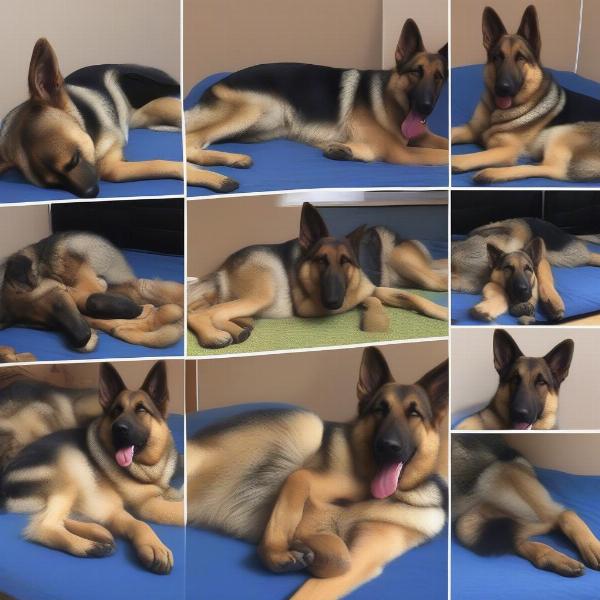German Shepherd Dogs (GSDs), known for their intelligence and loyalty, also have specific sleeping habits. Understanding these patterns can give owners insights into their dog’s health and well-being. This article will explore everything you need to know about German Shepherd dog sleeping, from typical sleeping positions to potential sleep problems.
Decoding Your German Shepherd’s Sleeping Positions
Just like humans, GSDs adopt various sleeping positions, each offering clues about their mood and comfort level.
- Curled up in a ball (The Donut): This classic position conserves body heat and protects vital organs, indicating your GSD feels safe and secure.
- Side sleeping: A relaxed posture, showing your GSD is comfortable and at ease in their environment.
- Superman: Lying on their stomach with legs outstretched, this playful pose often suggests a dog is ready for action and a quick nap.
- Back sleeping (Legs up): This position exposes the belly, demonstrating ultimate trust and relaxation.
 German Shepherd Sleeping Positions
German Shepherd Sleeping Positions
How Much Sleep Does a German Shepherd Need?
On average, a German Shepherd needs about 12-14 hours of sleep per day. Puppies and senior dogs may require even more rest. Factors like activity level, age, and overall health can influence their sleep needs.
Why is my German Shepherd sleeping so much?
While a certain amount of sleep is normal, excessive sleeping can sometimes indicate underlying health issues. If you notice a sudden increase in your GSD’s sleep, consult a veterinarian. what size dog cage for german shepherd
Creating a Comfortable Sleeping Environment for Your GSD
A comfortable sleeping environment is crucial for quality rest. Consider these factors:
- A supportive bed: Choose a dog beds and furniture that provides adequate support for your GSD’s joints, especially as they age. Orthopedic beds can be beneficial for senior dogs or those with hip or elbow dysplasia.
- Quiet and dark space: A quiet area away from household commotion can promote better sleep.
- Consistent sleep schedule: Maintaining a regular sleep-wake cycle can help regulate your GSD’s body clock and improve sleep quality.
What type of bed is best for a German Shepherd?
Consider a husky dog bed or a large dog cage size that offer ample space.
Addressing Sleep Problems in German Shepherds
Some GSDs may experience sleep disturbances, including insomnia, restlessness, or sleep apnea. These issues can stem from various factors like pain, anxiety, or underlying medical conditions.
- Rule out medical conditions: If you suspect a medical problem, consult your veterinarian for a proper diagnosis and treatment plan.
- Manage anxiety: Create a calming environment and consider behavioral modification techniques or medication if necessary.
- Establish a routine: A consistent bedtime routine can signal to your GSD that it’s time to relax and sleep.
Conclusion
Understanding your German Shepherd’s sleeping patterns is a key part of responsible pet ownership. By recognizing their preferred sleeping positions, ensuring they get enough rest, and addressing potential sleep problems, you can contribute to their overall health and happiness. Observing your German Shepherd dog sleeping can provide valuable insights into their well-being.
FAQ
- How many hours a day do German Shepherds sleep? German Shepherds typically sleep 12-14 hours per day.
- Is it normal for my German Shepherd to sleep on their back? Yes, this indicates complete relaxation and trust.
- What kind of bed should I get for my German Shepherd? Choose a supportive bed, possibly orthopedic, especially for older dogs.
- Why is my German Shepherd suddenly sleeping more than usual? Consult a veterinarian, as this could indicate a health issue.
- What can I do if my German Shepherd has trouble sleeping? Establish a routine, manage anxiety, and consult a vet to rule out medical issues.
- Do German Shepherd puppies sleep more than adult dogs? Yes, puppies require more sleep for growth and development.
- Should I wake my sleeping German Shepherd? Generally, it’s best to let sleeping dogs lie unless necessary.
ILM Dog is a leading online resource dedicated to providing expert advice on dog care and wellbeing. We offer comprehensive information on dog breeds, health, training, nutrition, and much more. Whether you’re a seasoned dog owner or just starting out, ILM Dog has the resources you need to provide the best possible care for your canine companion. Contact us at [email protected] or +44 20-3965-8624 for personalized guidance. Visit ILM Dog for more valuable insights.